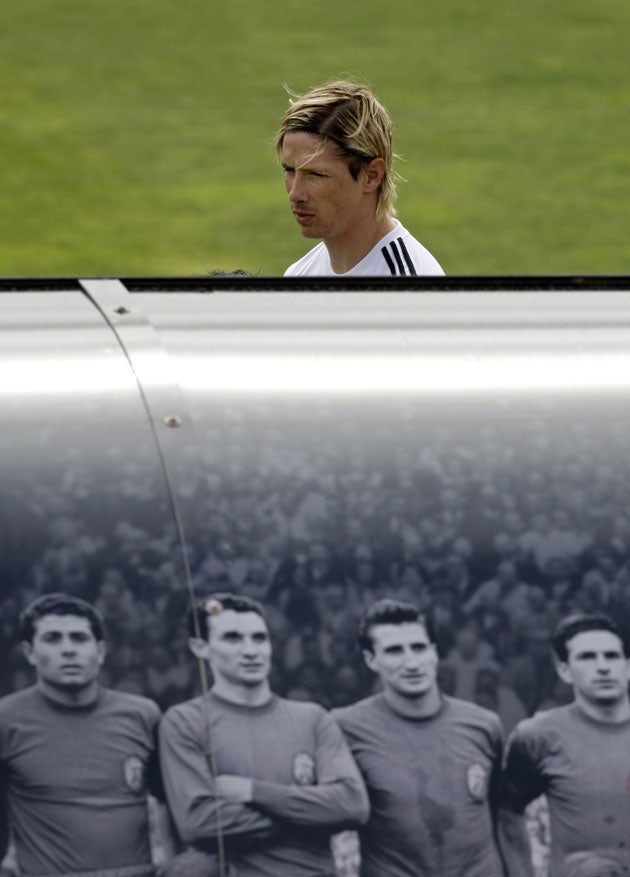South Africa's chance to show it is ready to shine
Early test of Rainbow Nation's ability to host first World Cup held on continent

Your support helps us to tell the story
From reproductive rights to climate change to Big Tech, The Independent is on the ground when the story is developing. Whether it's investigating the financials of Elon Musk's pro-Trump PAC or producing our latest documentary, 'The A Word', which shines a light on the American women fighting for reproductive rights, we know how important it is to parse out the facts from the messaging.
At such a critical moment in US history, we need reporters on the ground. Your donation allows us to keep sending journalists to speak to both sides of the story.
The Independent is trusted by Americans across the entire political spectrum. And unlike many other quality news outlets, we choose not to lock Americans out of our reporting and analysis with paywalls. We believe quality journalism should be available to everyone, paid for by those who can afford it.
Your support makes all the difference.It is never a good sign when most of the build-up to a tournament is spent justifying its existence but this time, at least, there is a clear purpose to the Confederations Cup. Perhaps, as the cynics say, these are meaningless fixtures in an already bloated calendar, but equally there is a clear and pressing need for South Africa to prove to itself and the world that it is capable of hosting an international football tournament.
"It's definitely time to kick off now, not only in terms of the organisation in South Africa but in terms of making sure they can deliver – and will deliver," said Sepp Blatter, president of the world governing body Fifa, a year ahead of the first-ever African World Cup. "That's why this Confederations Cup, one year before the big event, is crucial. It's very important for Fifa but also for the participating teams. I'm sure it will be a great competition."
Of course he would say that, but equally he has a point. Road-testing four of the stadiums and the transport and hotel infrastructure in a relatively pressure-free environment makes obvious sense, but there is value too for the teams.
For nations such as New Zealand and Iraq, this is a rare opportunity to mix with the world's elite. "Right now, [Fernando] Torres and [David] Villa are the best bar none as far as I'm concerned," said Chris Killen, captain of New Zealand, who begin their tournament against Spain today. "I really rate them that highly, and I imagine our defenders will be having a few nightmares about them. But everyone realises the opportunity a game like this offers us. A decent result against the number one team in the world would really put us on the map back home and that's something which is long overdue."
For the likes of Egypt and the United States, who have more realistic aspirations of qualifying for the World Cup and perhaps making an impression – although the African champions have begun the final phase of qualifying wretchedly – this is a chance to measure themselves against top sides from other regions. "We are a big team now and should not be afraid of our opponents," said the Egypt coach, Hassan Shehata. "We will not be in South Africa for fun. It's our duty to defend the reputation of Egypt and prove we deserve a place alongside the big boys and challenge them as well."
For Spain, Italy and Brazil, a semi-competitive environment offers the opportunity to introduce new ideas that would be too risky or complex to essay in the three or four days available before a qualifier. There is also, for coaches, the opportunity to see how players behave in a squad environment. Who gets homesick or bored? Who irritates other players? Squad politics are often overlooked, but France's selection of Alain Boghossian for the 1998 World Cup essentially because he was a good bloke who kept spirits up – and could do a job as an uncomplaining substitute – was deemed a huge success. Such considerations may not be central to a coach's selection but they may just be a decisive factor between two players of similar attributes.
For Spain, as European champions, it is a particular test. For the first time in over 40 years they head into a tournament without the expectation of choking. "In past tournaments we were billed as favourites, which was not realistic," said goalkeeper Iker Casillas, "but now, for the first time, I believe we are, so we want to achieve something great and win the title."
What is important is less who wins than the hints about next summer's World Cup. Will South Africa be the worst-ever hosts? Are Dunga's Brazil too pragmatic? Are Egypt ready to translate continental form into World Cup form? And have Spain really put their years of flakiness behind them?
Confederations Cup
The teams:
Group A South Africa, Iraq, New Zealand, Spain.
Group B Brazil, Egypt, Italy, United States.
The stadiums:
Johannesburg:
Ellis Park, capacity 70,000, has undergone major upgrade work.
Pretoria:
Loftus Versfeld Stadium, capacity 45,000, needed only minimal renovation.
Rustenburg:
Royal Bafokeng Stadium, capacity 40,000, has increased capacity, improved floodlights and added screens.
Bloemfontein:
Free State Stadium, capacity 40,000, has improved its media facilities and floodlights and has added screens.
Jonathan Wilson
Join our commenting forum
Join thought-provoking conversations, follow other Independent readers and see their replies
Comments